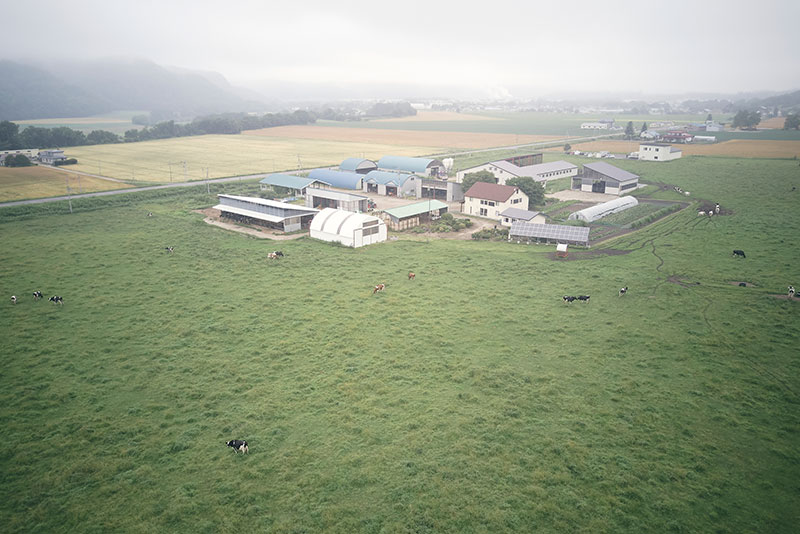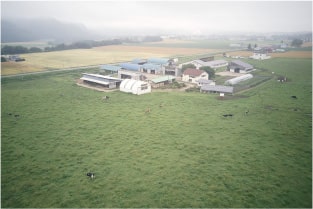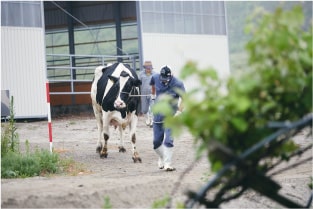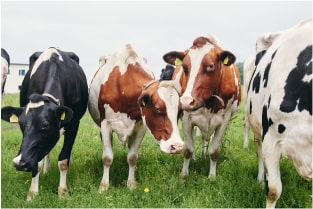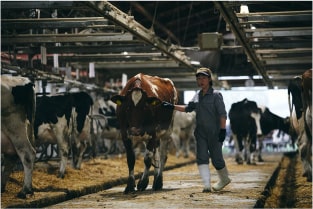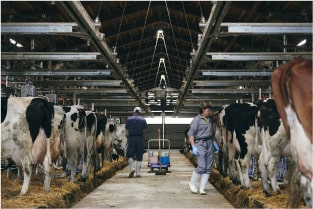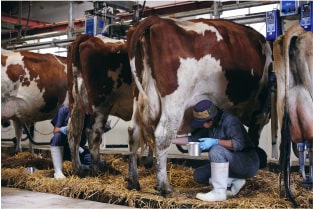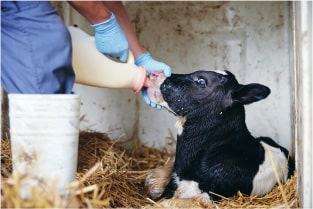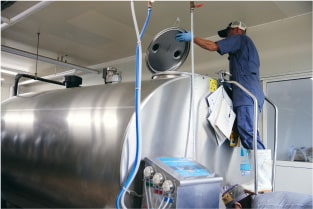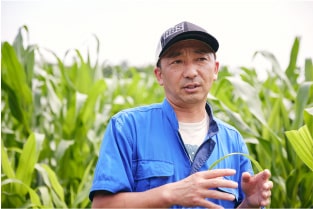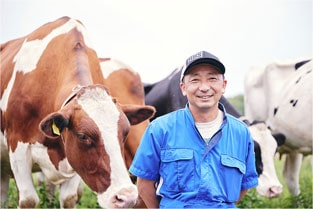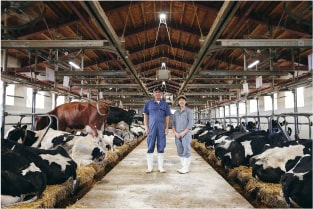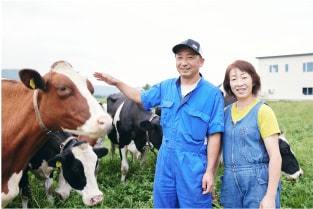
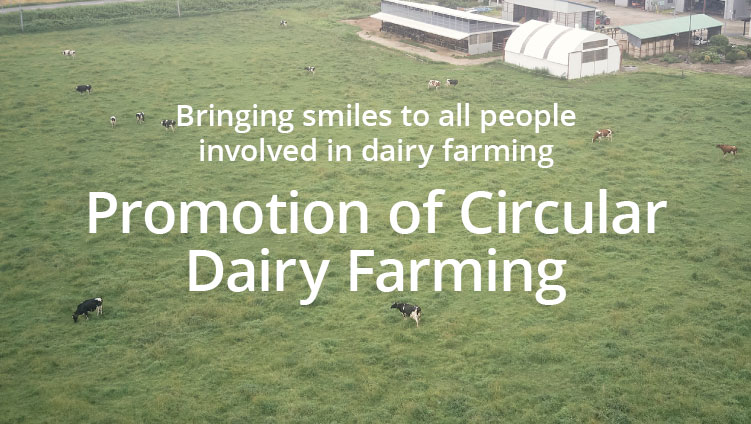
-
Cow-friendly, Environment-friendly,
Aiming for Circular Dairy Farming -
Meiji is working on circular dairy farming together with dairy farmers.
Organic dairy farming is conducted using organic feed that is designed to reduce environmental impact while considering cows comfort.
Meiji will deliver new value of milk while supporting dairy farming with consideration for the environment and the health of cows.
-
"Meiji Organic Milk" created with organic dairy farmers in Tsubetsu-cho, Abashiri-gun, Hokkaido.
Around 1997, Meiji began to consider how to make cow-friendly and environment-friendly milk, and started developing organic milk in cooperation with dairy farmers in Tsubetsu-cho.
After various trials and errors, in 2006, five dairy farmers acquired the "JAS standard for organic livestock products" certification, leading to the sale of their milk.Meiji Organic Milk is a milk certified by the organic JAS standard. We use only raw milk from dairy cows bred at designated farms in Tsubetsu-cho, Abashiri-gun, Hokkaido, based on the concept of organic farming methods.
-
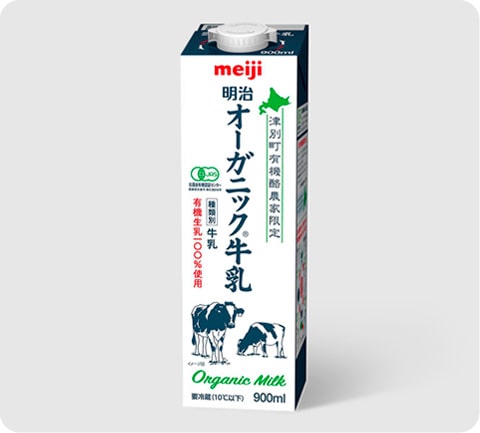
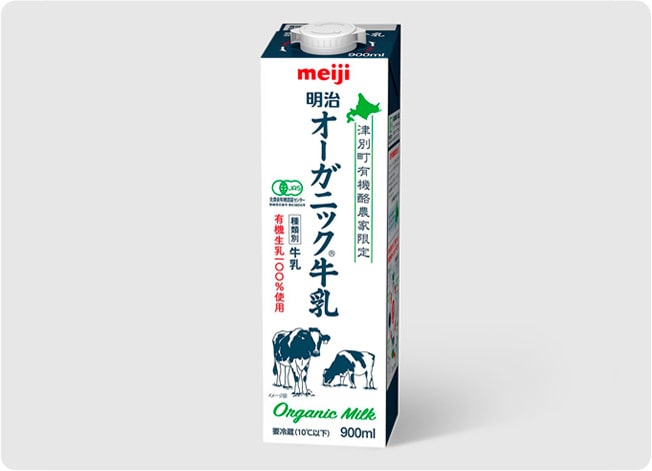
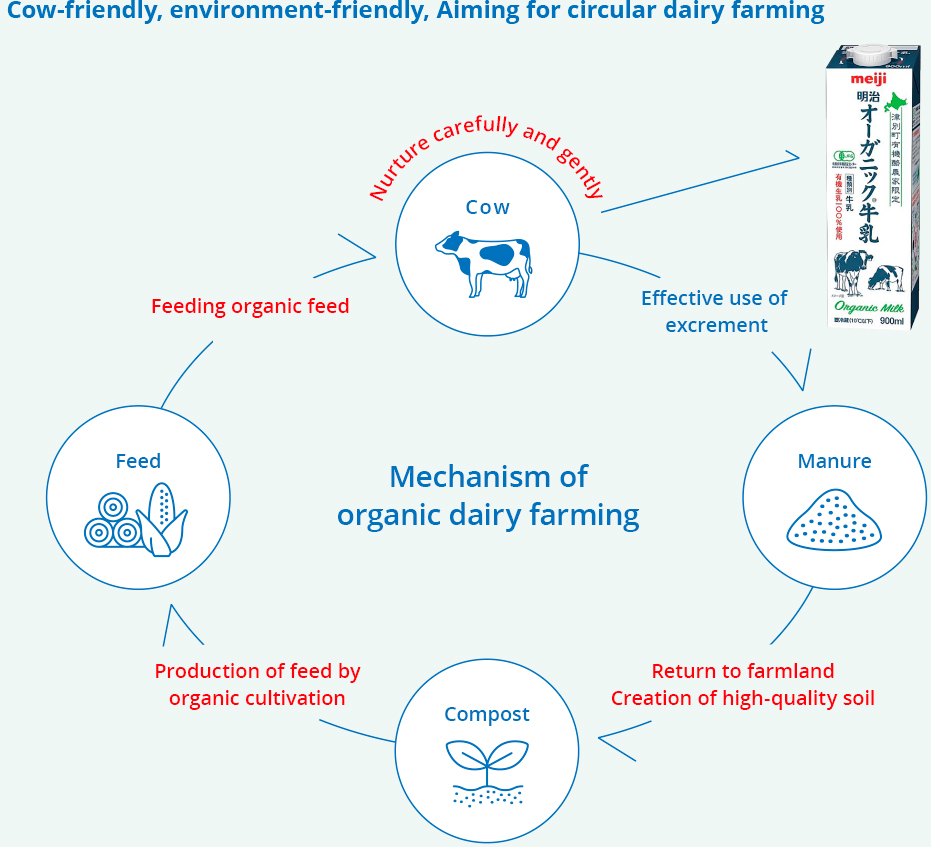
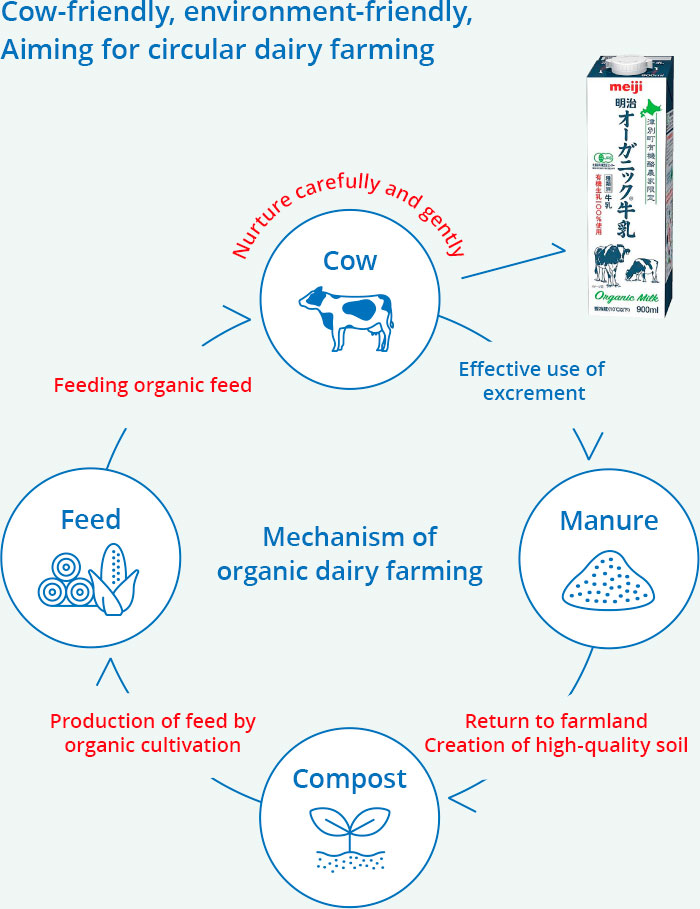
Nurture carefully and gently
Dairy cows are carefully nurtured in well-managed cowsheds in a low-stress environment.
-
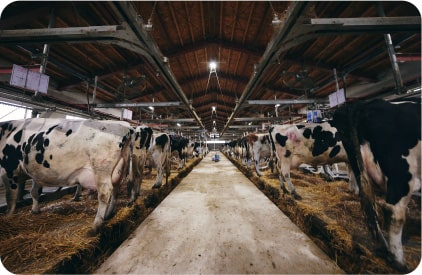
Each cow is given ample space.
-
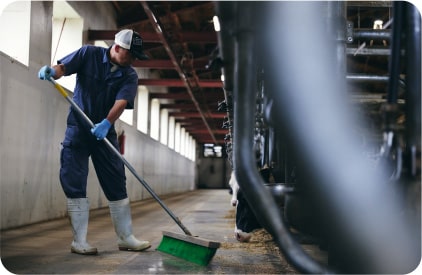
Careful maintenance.
-
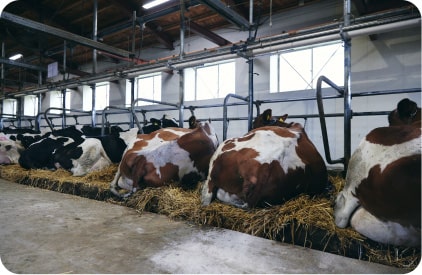
Cows after milking. Relaxing and lying down.
Return to farmland
Creation of high-quality soil
Manure from dairy cows is composted and returned to farmland.
Tsubetsu-cho operates a compost center as a town facility.
The compost center contributes to shortening the working hours of each farmer by contracting out the composting work that used to be carried out by each farmer.
-
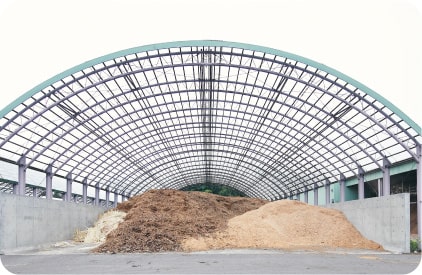
Compost Center
-
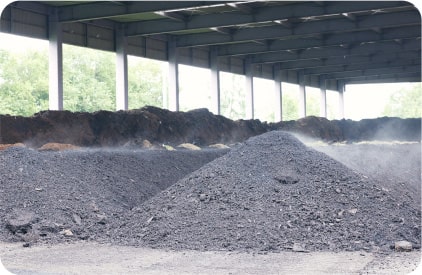
During fermentation, the temperature rises to 70-80°C.
Production of feed by organic cultivation
Organic feed is grown in a natural environment using a circular farming method.
Many weeds grow in the gaps between dent corn in organic feed fields that are cultivated without using chemical fertilizers or pesticides.
Manual or mechanical weeding is laborious work. The absence of chemical fertilizers also requires the innovation of effective compost for better growth and good soil quality.
-
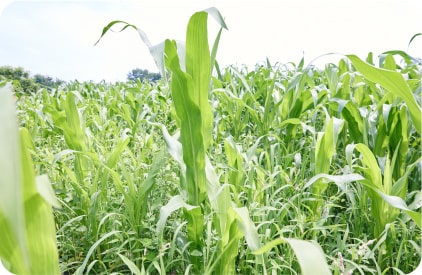
In organic fields, weeds grow.
-
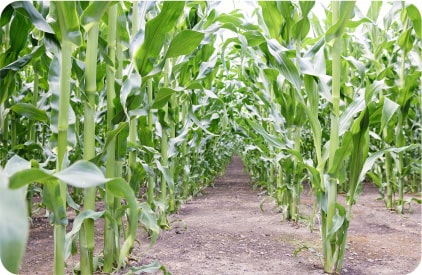
In conventional fields, not so many weeds grow.
Feeding organic feed
Daichi Co., Ltd., which was established as a subsidiary of JA Tsubetsu, has been operating the TMR Center1 that produces and sells feed since 2014.
The TMR Center contributes to shortening the working hours of each farmer by contracting out the work of mixing feed.
-
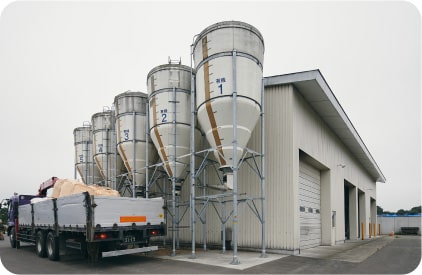
TMR Centre
-
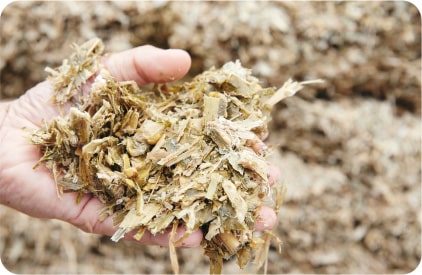
Fermented corn used as raw material for TMR.
TMR Center:
A facility that produces TMR (total mixed rations), which is a feed mixed with all necessary nutrients such as minerals and vitamins, in addition to roughage such as pasture and concentrated feed such as corn.

Mr. Kenichi Ishikawa, Chairman of the Tsubetsu-cho Organic Dairy Farming Research Association, spoke about the past and future circular dairy farming.
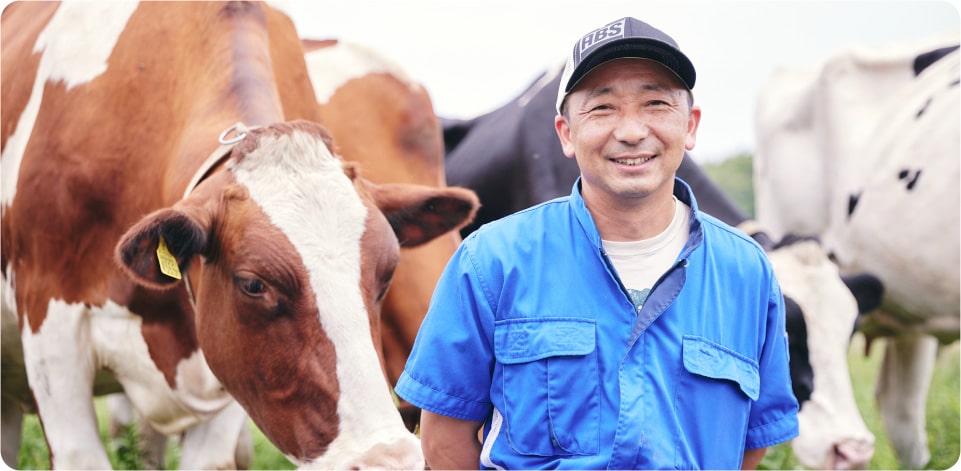
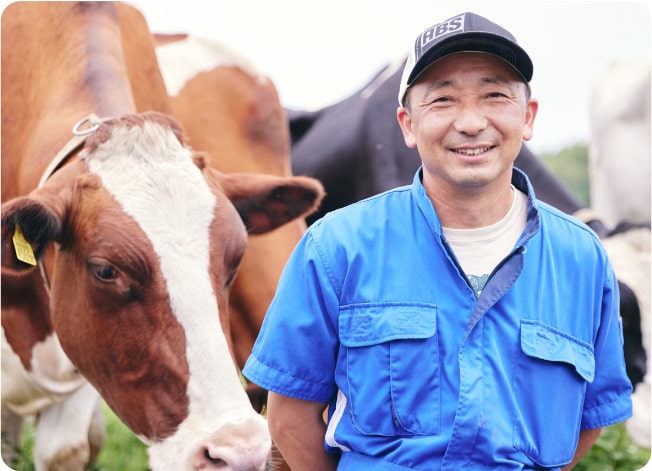
Recurrent failures kept us waiting five years for success.
Produce of organic milk was quite a struggle.
“Organic milk” is milk that is produced from organically fed cows.
We pasture cows nurtured without the use of chemical fertilizers or pesticides, and do not use antibiotics for preventive purposes.
Because we must comply with the detailed regulations of the organic JAS (Japanese Agricultural Standards) system.
The trigger for starting organic dairy farming was an invitation from Meiji representative asking, "Would you like to try organic dairy farming?" That was in 1999. Organic JAS had just been established for organic produce, so we had no idea of organic dairy farming at all.
To study this, three dairy farmers from Meiji and Tsubetsu and people interested in organic dairy farming from all over Japan went to Europe for training. When we went to Europe, we found many kinds of milk, including organic milk, and an established raw milk distribution system. Seeing this, we became very interested in organic dairy farming and established the "Tsubetsu-cho Organic Dairy Farming Research Association".
However, it was very difficult to shift to organic dairy farming. It took us about five years to produce organic milk. It was a process of trial and error, making mistake after mistake. There was still no precedent in Japan, so we didn't have the technology to grow feed crops without using pesticides or chemical fertilizers.
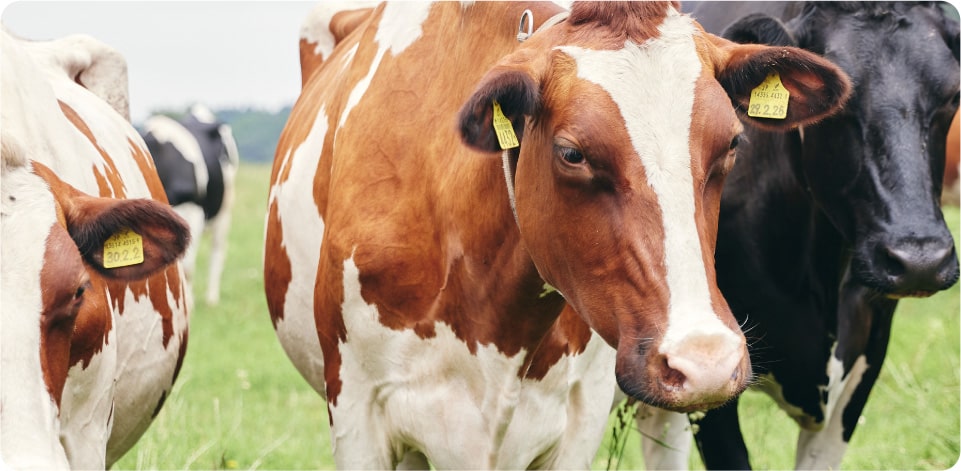
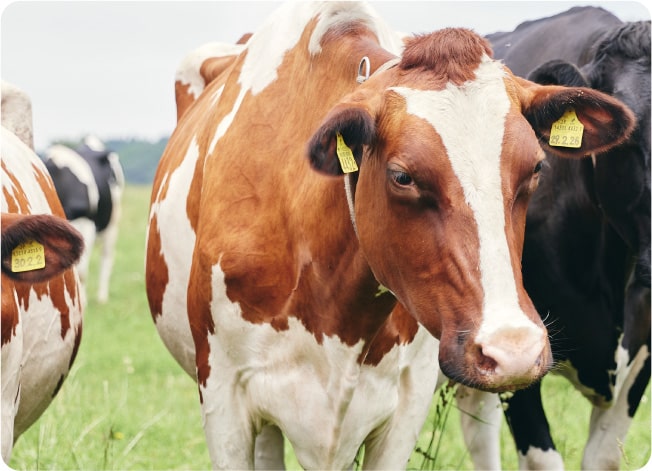
Organic milk starts with "making soil"
Not only the way the cows are raised, but the feed must be organic as well. How can we keep cows on organic dent corn? We were also very worried, and people around us were also half in doubt.
So we went overseas for training many times. We went to Germany, Holland, France, Denmark, and other European countries, as well as the United States, Canada, and New Zealand.
I saw many successful cases where dent corn and grass are grown without using chemical fertilizers to the same extent as conventional farming methods. Having seen many such successful cases, I was able to make up my mind that this was the way to go.
Organic milk starts with “making soil," so it takes time and money. While receiving various advice, the yield of organic feed increased year by year. What I learned after trying it was that it was possible to grow crops without using chemical fertilizers or pesticides.
However, we still rely on imports from overseas for some of our feed. We are now working on changing everything to self-supplied feed eventually. Looking at the recent world situation, I realize that when prices soar and supplies cannot be imported from overseas, it is important to have a circular system that makes good use of compost or urine to produce crops.
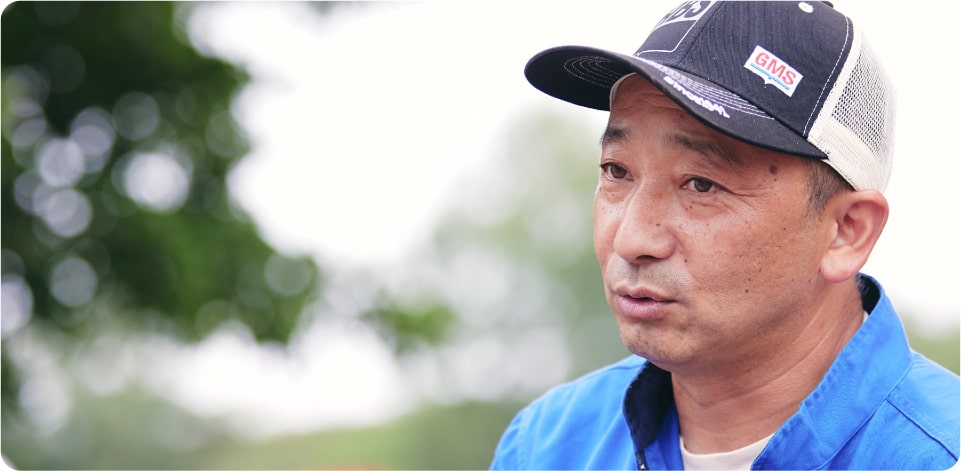
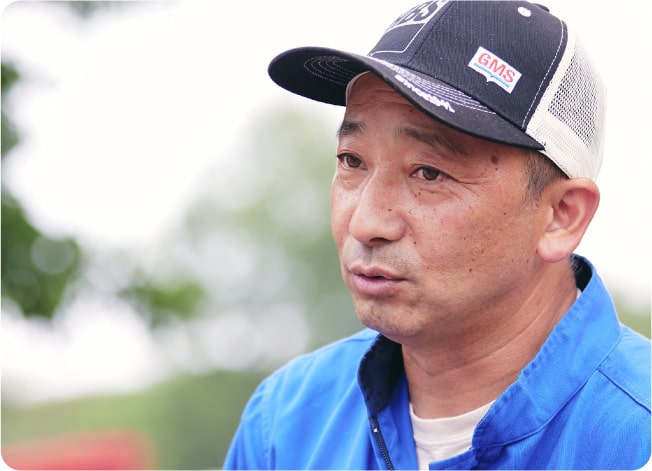
We don't settle for "old-fashioned."
Because it is organic, we seek advanced technology.
We don't stick to "old-fashioned methods" because they are organic, but rather, we incorporate "advanced technology" because they are organic.
Our farm is basically run by two people, my wife and I. We have 130 cows at all including 65 multiparous, and the total size of our property is about the size of two Tokyo Domes. In order for two people to do all the work, we needed to find a way to increase our efficiency. We came up with the idea of "outsourcing" and "mechanization."
The outsourced works are mainly feed related. Harvesting of feed, mixing of feed, and delivery. We ask the TMR center for those. The largest part of a dairy farm's daily labor hours are related to feeding. It used to take 4 hours a day, but now it takes only 30 minutes.
Feeding is also mechanized. However, we do not leave everything up to them. The amount of feed served in the automatic feeder is changed for each cow as we monitor their condition.
In the organic cultivation of feed, a tractor is equipped with GPS automatic steering to weed the dent corn fields. The technology drives the tractor while keeping it within an error range of only a few centimeters. This is not possible when a person drives the tractor. We have been using this technology for about three years now.
Since there is a limit to the area, we can secure as a feedlot on our property, I believe that our current limit is 65 cows, which is in balance with the amount of feed we can harvest. If we buy a lot of imported feed, we could raise 100 or 200 cows, but that is not what we are aiming for.
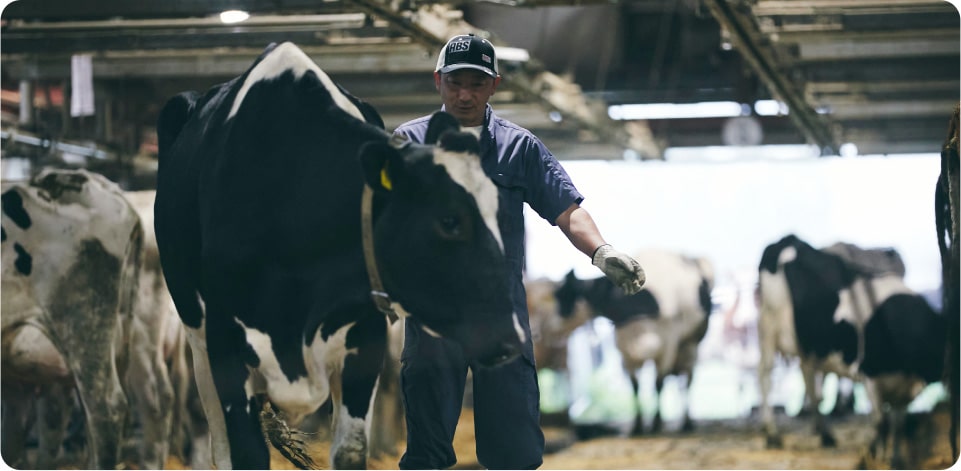
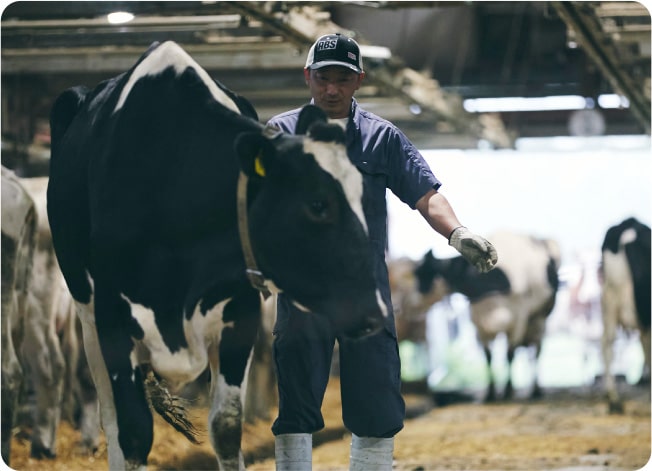
We want to unite everyone's power to achieve the use of 100% domestic organic feed.
I really think it is important to raise the level of feed self-sufficiency ratio when the yen depreciates and international conditions change rapidly. If possible, we would like to move toward producing milk with 100% organic feed produced in Hokkaido or in Japan.
As of now, we are about 75% self-sufficient, so it's a little bit more. But the hurdle for that "a little more" is very high.
Since it is difficult to achieve this through our efforts alone, we would like to gradually expand our organic feed by asking those who produce organic agricultural products to produce corn, etc., and bring our domestic production to 100%. We are also looking forward to the “Strategy for Sustainable Food Systems, MeaDRI “being promoted by the government.
In Europe, the majority of organic farming is fodder fields and pasture, and even in mountainous areas where machines cannot enter, they have organic certification. Of course, the government is also supporting it. We need a flow of people creating organic dairy farming together.
The government, the town, and the JA (Japan Agricultural Cooperative) have been and still are quite supportive of our organic dairy farming. Especially with the JA, even though it is difficult to handle organic and other small-lot products, the Tsubetsu JA is very flexible and supportive. We graze our cows in the town's public pasture, which the town has also converted to organic and leased to us.
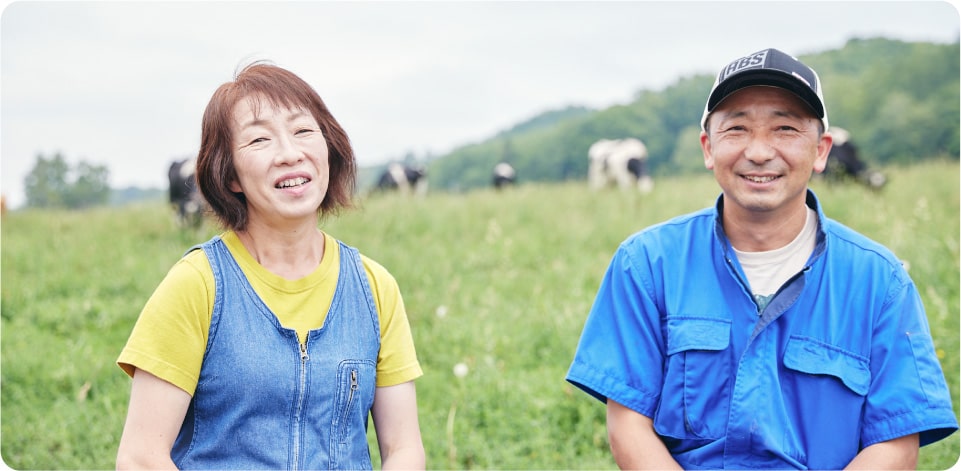
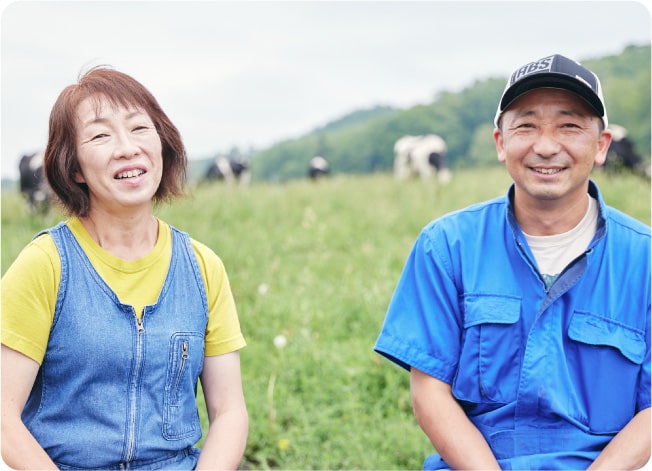
Organic milk takes time and effort to produce.
We want as many people as possible to enjoy our elaborate taste.
Once a week, the Tsubetsu-cho provides organic milk for school lunches in elementary and junior high schools. After drinking the milk, "Sweet!" children said spontaneously, who are the biggest consumer of milk. The rich and full-bodied organic milk must have made the children say so.
Since a couple of years ago, we have also started a dairy educational farm. Students from elementary, middle, and high schools come to our farm to learn and experience organic dairy farming. We also accept vocational school students and high school students from outside of Hokkaido. The students from outside of Hokkaido do not often see cows in pastureland, so it must be quite unusual for them. They enjoy spending half a day in the pastureland and lying down with the cows.
We hope to continue this approach with Meiji for a long time. We may not be able to make immediate and drastic changes in our goal of 100% domestic self-sufficiency in organic feed, but we would like to continue to make gradual progress.
Most supermarkets in Hokkaido carry our organic milk. As the next step, we would like to work with Meiji to find a way to reach people nationwide Japan who want to drink it.
We want as many people as possible to drink the organic milk because we spend so much time and effort to produce.
There are people who produce dairy products, and there are people who taste and enjoy them, and both people are necessary for a circular dairy farming.
Mr. and Mrs. Kenichi Ishikawa
Chairman of Tsubetsu-cho Organic Dairy Research Association
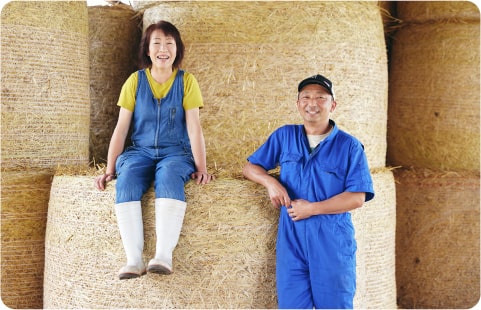
Mr. and Mrs. Kenichi Ishikawa
Chairman of Tsubetsu-cho Organic Dairy Research Association
At the Festival of Agriculture, Forestry and Fisheries Festival held on 2019, Kenichi Ishikawa, Chairman of the Tsubetsu-cho Organic Dairy Farming Research Association was awarded the "Emperor's Cup", which recognizes agriculture, forestry and fisheries managers who have achieved excellent activities and performances. The main reason for the award was "promotion of organic dairy farming and the cultivation of quality subsistence feed using organic farming methods."

